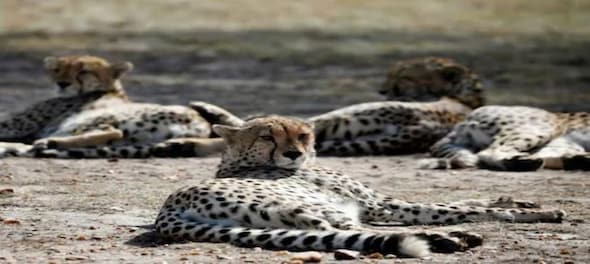
The special chartered cargo plane Boeing -747 carrying eight cheetahs from Namibia, which was supposed to land in Jaipur on Saturday, has been diverted to Gwalior airport.
This happened a day before the scheduled arrival of the cheetahs that are being reintroduced in the Indian territory after they went extinct in the 1950s. Authorities revealed that the landing destination of the special plane was changed.
As per the revised plan, the cheetahs will be flown to Gwalior from where they will be transported in special helicopters to the Kuno National Park in Sheopur district of Madhya Pradesh, ANI quoted SP Yadav, Project Cheetah chief and member secretary of National Tiger Conservation Authority, as saying.
Officials did not reveal the reason for the change even as trials were conducted on Thursday, The Times of India reported.
Earlier reports suggested that the Indian Air Force (IAF), which was set to deploy its Chinook heavy lift helicopters to ferry the felines from Jaipur to the Kuno national park, was looking at airfields closer to the national park for landing the plane carrying the cheetahs from Namibia.
On the occasion of his birthday on September 17, Prime Minister Narendra Modi will release three cheetahs in quarantine enclosures. He will release two cheetahs from closure number one and the third from the second enclosure, 70m away. The rest of the cheetahs will be released in their respective quarantine enclosures, Yadav said.
The PM is releasing the wild cheetahs as part of the “Reintroduction of the Cheetah” project through which the government plans to revitalise and diversify India's wildlife and its habitat.
The last Cheetah in India died in Sal forests of Chhattisgarh's Koriya district in 1948. The country declared the wild animal extinct in 'the country in 1952.
Meanwhile, one of the world’s leading experts on cheetahs Dr Laurie Marker, who is accompanying the felines to India, said managing a human-animal conflict will be the biggest challenge in their new home.
Marker has been an advisor to the Indian government on the cheetah relocation project for the last 12 years. The American expert has carried out a relocation project from Namibia to South Africa in 2005. She said South Africa now has nearly 1,000 cheetahs.
According to the expert, 77 percent of the cheetahs in Africa reside in regions outside protected areas. The wild cats have been able to co-exist with minimal human-animal conflict because of the awareness programmes undertaken by the governments to educate farmers on how to handle cheetahs.
“Since cheetahs do attack livestock, the biggest threat to the cheetah I would say, and to conservation projects like reintroduction in India, is from farmers trying to defend their livestock,” Marker told Indian Express in an interview. To deal with this, farmers have to be told to keep herders, guardian dogs, and also keep livestock healthy and strong so they don’t get picked up by cheetahs, she added.



